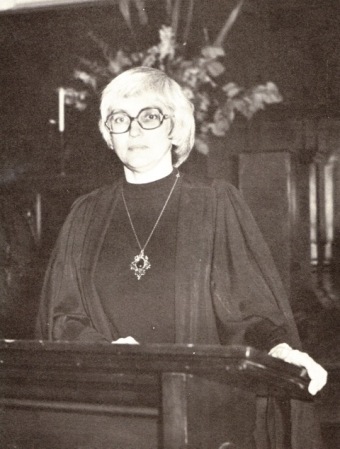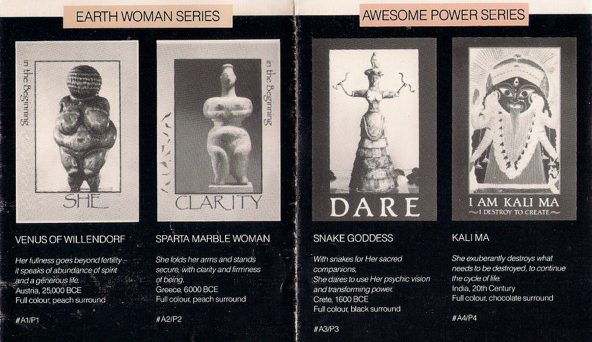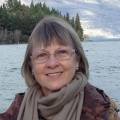
On 15th May, 2016 thea Gaia left this earth which was her home for 85 years. thea was born
Dorothy Ivy Wacker in Gatton, Australia on 9th February, 1931, the eldest of four children.
Her family were descendants of German immigrants who came to Australia in the 1860s.
In primary school, Dorothy was a bright student, winning a bursary enabling her to continue
her studies at high school which she completed in 1947. She then studied primary teaching
at Queensland Teachers’ College and from 1950-52 she worked at School for the Deaf,
Dutton Park, Brisbane.
Dorothy joined South Brisbane Congregational Church and became President of Queensland
Congregational Youth Fellowship. At age 22, she decided to take theological training to
become a Congregational minister. Dorothy studied for Bachelor of Arts and Bachelor of Divinity at the University of Queensland. In 1959, she was awarded a Certificate of Ordination by the Queensland Congregational Union. Dorothy was ordained on 17th April, 1959 at Broadway, Woolloongabba, the first woman ordained as a Minister of Religion in Queensland. Over the next 10 years she was minister for Belmont, Broadway and Chermside Congregational Churches.
Dorothy was Director of Christian Education (1965-68) and Acting Secretary of Queensland
Congregational Union (1966-67). In these roles she was often involved in women’s issues
e.g. as member of the Council preparing for the Uniting Church which decided that women
should comprise a third of all committees and councils.
In 1970 she was called to Applecross Church in Perth. She was State President of the
Congregational Union (1973-1974); Vice President (1973-75), then President Elect of the
Congregational Union of Australia (1975-77) and Member of the World Council of Churches,
Nairobi (1975).
There was a growing mood for ecumenical activity with the Uniting Church about to be
birthed (1977), unifying Congregationalists, Methodists and Presbyterians. Many Catholics
were also moving towards ecumenism. Dorothy was President of Australian Church Women
(1975-77) and worked very successfully with her Catholic Vice-President, a ground-breaking
partnership.
In 1977, Dorothy was called to Pilgrim City Church, Adelaide. There, Dorothy was
Chairperson of the Australian Consultation of Theologically Trained Women (1978) and the
Australian Representative at the Christian Conference of Asia discussing women’s roles in
church and society.
In 1979 after 20 years in the ministry and much soul searching, Dorothy resigned as a
minister and member of the Uniting Church. Her spiritual journey had brought her to
seriously question the validity of religious systems in a person’s spiritual quest, with all their
hierarchical structures, authority, tradition and patriarchal emphasis, and the general place
of women in church and society. Her courageous decision was largely unsupported and led
her to a place of solitude, meditation and reflection. She lived for a year in a cottage by the
sea, exploring the possibilities given by solitude and rediscovering nature. It was a time to
renew herself, paying attention to her experience and needs as a woman.
Dorothy emerged very different, with a new way of thinking. She returned to studying
Religious Education and Women’s Studies and began establishing women’s spirituality
groups, encouraging women to become empowered by exploring their own spirituality.
With other feminists, she initiated The Rainbow Circle in Adelaide. In 1982 she changed her
name from “Dorothy” (gift of God) to “thea Rainbow” reflecting her understanding that the
Divine could be imaged as female, a gift of Goddess.
She taught courses: Ancient Images of Women, Women of Spirit throughout the Ages,
Women and Personal Power. With two others, she established a quarterly magazine, “The
Rippling Web: a Womanspirit Linkup.”
In 1984, thea travelled to the United States, living in California, visiting other cities, and
researching Women and Religion. In 1985, she and another woman created “Womandala”
Spirituality Centre, Adelaide.
In 1987, thea and Rosanne Debats created a series of posters of ancient Goddesses – Venus
of Willendorf, Marble Woman of Sparta, Snake Goddess and Dove Crown Goddess of Crete,
Kali Ma of India, Ishtar and Lilith of Sumeria , and the Ivory Seer of Kalach-Nimrud. The
posters sold in Australia, New Zealand, United States, Canada, and England. Women
responded differently to each image, but all provided sustenance and support to women
seeking to recover their spiritual heritage in a world dominated by male images and stories.

thea moved to Canberra in the early 1990s. She tutored at the University of Canberra, focussing on women’s mental health and spirituality. She was a natural scholar and teacher so this work suited her well and she was greatly respected in these roles. thea set up a women’s spirituality centre, which became Gaia Womanspace at Manuka and with other women ran spirituality workshops and seasonal rituals.
As her own spiritual journey continued, in 1994 thea again changed her name, reflecting an
understanding of the sacredness of Earth as Mother…thea Gaia. This same year, the first
Women’s Spirituality Conference in Australia was held.
During the late 1990s in Canberra, thea gathered committed and dynamic women who
together created and celebrated a series of wonderful and sometimes elaborate seasonal
rituals. These were held at thea’s home and later at the homes of others, in natural
environments and public parks. This period was a highlight both for thea and for the women
who participated. There was an extraordinary flowering of creative energies and profoundrichness, learnings and discoveries.
thea initiated Woman’s Spirit Rising in Canberra and in 1997 was instrumental in founding
Sisters of Gaia, a network bringing together women committed to living a feminine
spirituality. As a Sister of Gaia, thea states : “I treasure life. I treasure my life; I acknowledge
that my life comes in a woman’s form. I undertake to lead a life with a woman’s wisdom to
create spiritual paths, to affirm women, to use female symbols.”
Like thea, many women had left mainstream churches, feeling disillusioned and alienated
from institutions where symbolism, imagery and language about God were exclusively male.
This overt superiority of “male” flowed down to the practices, worship, government and
culture of the church itself, creating religious institutions where women were diminished.
Through women’s spirituality, many were introduced to the Goddess and felt a resonance in
relating to the Divine as female.
From Canberra, thea moved to the Blue Mountains to study and work with community
groups. She is especially remembered for her service at Winmalee Neighbourhood Centre.
Women were always welcome at her home in Springwood, a “sacred space” where she held
empowering workshops, discussions and rituals.
The final years of thea’s life were spent back in Canberra where she connected with the
Centre for Progressive Thought in Christianity, at St James’ Uniting Church. Here, she
brought her woman’s perspective and understanding of feminine divinity to nudge away at
the edges of patriarchy within the Christian tradition.
thea continued making new friends, initiating study groups, starting social circles,
participating in meditation gatherings, continuing seasonal rituals and in many other ways
being a catalyst for change. Often women would tell of how thea came into their lives when
they were at a crossroads and speak of their gratitude for her support and inspiration.
thea was a great “ponderer” as she would say, of the universe and the mystery of life. She
was an insightful, independent thinker and something of a non-conformist. She was a great
communicator, inspiring others and changing the lives of countless women. She challenged
their thinking, helped them grow spiritually and supported them. She was a teacher,
philosopher, writer, mentor and a friend to all who passed her way.
Above all, she was compassionate with a deep, unconditional love for people. Despite some
challenging difficulties in her life, thea emerged a woman of true worth and of great
significance – a pioneer and midwife of Women’s Spirituality in Australia.
* * *

Glenys Peacock was co-ordinator at Womenspace in Brisbane, Australia from 2003-2014 and has long been an advocate of Women’s Spirituality and feminist thealogy. She holds a BA (Hons) and a BTh.


I first met thea in the mid-80s in California. I had no idea what a trailblazer she had been in the church. What a woman! The last time I saw her was when I was in Australia in 2004, and true to form, she organized a pot luck lunch and discussion in the park! I had no idea this was her modus operandi at the time. Blessed be her work and her memory. Thanks for this Glenys.
LikeLike
thea was never one to talk about her accomplishments but her leadership and networking skills were there from the very beginning.
LikeLike
Fascinating and a very moving post on thea Gaia née Dorothy Ivy Wacker, thanks Carol. You also mentioned: “She lived for a year in a cottage by the sea, exploring the possibilities given by solitude and rediscovering nature.” And I am so delighted to see the women’s movement moving more and more toward what might be called ecofeminist spirituality.
LikeLike
And thanks so much Glenys for posting this fine journey with Gaia née Dorothy Ivy Wacker.
LikeLike
It is my privilege and honour to have written this for thea :-)
LikeLike
Wonderful and deeply moving post. I applaud this woman’s spiritual journey that led her back to the edge of patriarchal thinking to help create change. I don’t believe that I could take up residence on that edge.
LikeLike
Glad to “meet” this awesome woman. Thank you for introducing us.
LikeLike
Reblogged this on GrannyMoon's Morning Feast.
LikeLike
thea never went back to the church but neither had she entirely rejected it. She recognized that people were spiritual beings and expressed this in a variety of ways. thea connected with the Centre for Progressive Thought in Christianity in the later part of her life to bring a different perspective to the theology and culture in the church for those who were open minded and recognized that other understandings of the sacred were also valid.
LikeLike
Interesting. Thanks.
LikeLike
Reblogged this on PaGaian Cosmology and commented:
thea Gaia and I were both leaving the church, the Christian paradigm, at the same time in 1979 … we lived in different parts of Australia, but met (corresponded) through writing for a publication called “Magdalene” which was put together by a group of women seeking a spirituality that spoke to them (Marie Tulip was one of them ). At that time thea was still Dorothy Wacker. We met up again in the late 80’s after I returned to Australia from California where I had been finishing a Master’s degree in Theology and Philosophy (though it was with the Graduate Theological Union, and my supervisor was a Jesuit, I was allowed to write on the topic of my choice, which was “Motherhood Mythology” – researching the story of the Great Mother). It was so encouraging to be able to visit her in Canberra at the time, and share so much, when Goddess-mind was just (re)emerging and so rare in Australia. I was still trying to work out what I would ever do with an M.A. in Theology – I did apply for teaching jobs at seminaries for a while, but I was not saying anything they wanted to hear. I often said at the time, that it was an eminently useless degree for a woman to have. But as I journeyed more down Goddess path, celebrating Her Seasons and Creativity, I no longer questioned the value of the study. And thea was part of the support network: I thank her deeply for her love and great conversations especially in the 1990’s … both in Canberra and in the Blue Mountains. We shared space in Springwood in the late 90’s for a while, but it didn’t work out … I guess I had another path to travel: but thea and I reconnected in the days of the Goddess Association in Australia, when Patricia Corner brought so many of us Goddess women together in wonderful conferences. thea and I also share “country”: that is, we are both from South-East Queensland, not too far from each other as the crow flies, and she was born th same year as my Mum. I am so thankful to be able to put this story about thea on my blog … a remarkable story. Thank you Glenys Peacock for writing it, and thank you thea.
LikeLike
It was wonderful to see thea’s spiritual journey, much of which paralleled my own. I too was in the Congregational Church in Queensland and first met thea (who was then Dorothy) in 1959 when she was ordained as the first woman minister in Queensland. I remember her involvement at youth camps which I always attended as a young teenager and even then, I related well to her, perhaps because she was young and a woman in a church where other clergy were older men.
I lost track of her when she moved to Perth and I moved out of the country to PNG. We re-connected at a Congregational reunion in Brisbane and by then, both she and I had seriously questioned many aspects of the church. For her, not only had it been about her spirituality but it was a major issue for her with the church being her career. For me, it was more about personal spirituality and in that quest, I had studied Theology with a major interest in Feminist Theo/alogy. thea opened my eyes to other possibilities and perspectives and from that point on, became my loved and respected mentor.
We stayed in touch regularly and had many interesting phone conversations and much longer discussions when we met in person . I visited her in the Blue Mountains where I met some other women on similar spiritual journeys – Annabelle, Glenys, Brenda. When thea visited Brisbane, we held workshops and conversation dinners at Womenspace where I was Coordinator. We travelled together and in 2004, attended the Feminist Theology Conference in Bristol and spent some more time exploring wonderful places like Bath and Avebury. thea’s knowledge and wisdom were extraordinary – I learned so much from her. Even in the last years of her life when I visited her in Canberra, there was still that beautiful heart with such a loving interest and care for everyone she knew. thea was truly an “awesome” woman.
LikeLike
Thank you Glenys for writing this story of thea’s life and posting it for us to read here. I was blessed to have thea as a friend, guide and mentor for 20 years. I knew some of her biography but not all of it. Wonderful to read about it all here. Blessings.
LikeLike
Thank you for your comment. Like you, thea was for me a beautiful friend and mentor for many years. You might like to read the reply I have added to Glenys Livingstone’s comment.
LikeLike
To Glenys-1 and Glenys-2: had you noticed that Northern Rivers author, Gillian Mears, (The
Mint Lawn, Foal’s Bread) had died the following day in May?
LikeLike
Reblogged this on Fabienne S. Morgana and commented:
Honouring Ancestors of Spirit.
LikeLike